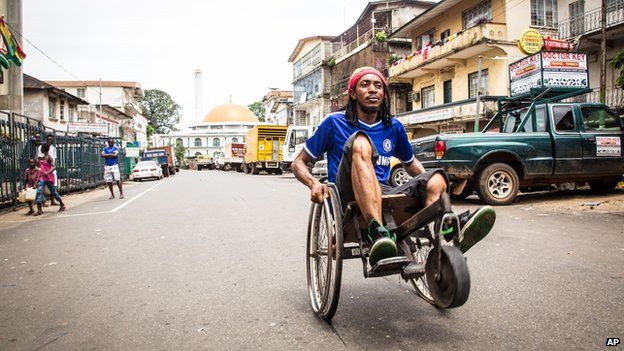Ebola outbreak: Sierra Leone lockdown declared 'success'
- Published

A three-day curfew aimed at containing the Ebola outbreak in Sierra Leone has been declared a success by authorities.
They say more than a million households were surveyed and 130 new cases discovered.
Sierra Leone is one of the countries worst affected by the outbreak, with nearly 600 of the almost 2,800 total deaths recorded so far.
Some health groups have criticised the lockdown, saying it would destroy trust between patients and doctors.
Nearly all of the deaths in the world's worst Ebola outbreak have been recorded in Guinea, Liberia and Sierra Leone.
The World Health Organization (WHO) says the situations in Senegal and Nigeria have now been "pretty much contained".
According to the UN agency, the number of overall deaths from Ebola has risen to 2,793 and the disease remains "a public health emergency of international concern".
The deadly virus is transmitted through sweat, blood and saliva, and there is no proven cure.
In other developments:
- Liberia, the country that has been worst hit by the outbreak, has announced a four-fold increase in the number of beds for Ebola patients
- Schools in Nigeria are reopening on Monday, after the summer break was extended for fear of the spread of Ebola, but teaching unions want the government to provide more safety measures
- A Spanish priest who was diagnosed with the virus whilst working in Sierra Leone was flown back to a military airbase in Spain on Monday for treatment in a Spanish hospital
- A second deployment of US troops arrived in Liberia on Sunday as part of a mission that will see 3,000 soldiers helping the Liberian health services in their response to the outbreak
BBC Ebola broadcast:
The BBC World Service is launching a special programme containing the latest news about the Ebola outbreak in West Africa.
The first edition will be at 19.50 GMT on Monday 22 September and the programme will continue each weekday.
In Sierra Leone, head of the Emergency Operations Centre Stephen Gaojia told the BBC that the lockdown was largely successful, and the compliance and receptiveness of Sierra Leoneans was "overwhelming".
He said 130 new cases had been confirmed, which would have helped spread the virus if they had remained undetected. Results were still outstanding on 39 suspected cases.
About 100 dead bodies believed to be of Ebola victims, which could otherwise have been secretly buried without homes being quarantined, were retrieved and buried, officials say.
Bodies of Ebola victims are highly contagious and their swift burial is considered key to containing the disease.
Many people have been reluctant to seek treatment for Ebola, on the basis that there is no cure, even though about half of those infected have recovered with the help of rest and rehydration.
The BBC's Umaru Fofana in the Sierra Leone capital Freetown says health officials have admitted that the lockdown has exposed the country's inadequate response capability.
Ambulances are in short supply, as are the isolation wards to look after patients, with almost all Ebola treatment centres confined to the east of the country, he says.
There are also too few teams available to bury the dead, partly because of the social stigma attached to the role.
The curfew in Sierra Leone came into force on Friday morning, with the country's six million inhabitants confined to their homes.
Around 30,000 medical volunteers travelled to affected neighbourhoods to find patients and distribute soap.
Ebola deaths
Figures up to 13 January 2016
11,315
Deaths - probable, confirmed and suspected
(Includes one in the US and six in Mali)
-
4,809 Liberia
-
3,955 Sierra Leone
-
2,536 Guinea
-
8 Nigeria
School strike delayed
In Nigeria, Africa's most populous country, teachers' union spokesman Emmanuel Hwande Ora told the BBC that the threat of a strike has been suspended.
However, the union urged the government to introduce more safety controls in schools to prevent the spread of Ebola.
The BBC's Will Ross in Nigeria says people are still on high alert, so students and staff queued up to have their temperatures taken outside the school gates before the new term began.
Eight people have died in Nigeria out of 20 who have contracted the disease, but no new cases have been discovered for 10 days.
Ebola virus disease (EVD)
- Symptoms include high fever, bleeding and central nervous system damage
- Spread by body fluids, such as blood and saliva
- Current outbreak has mortality rate of about 55%
- Incubation period is two to 21 days
- There is no proven vaccine or cure
- Supportive care such as rehydrating patients who have diarrhoea and vomiting can help recovery